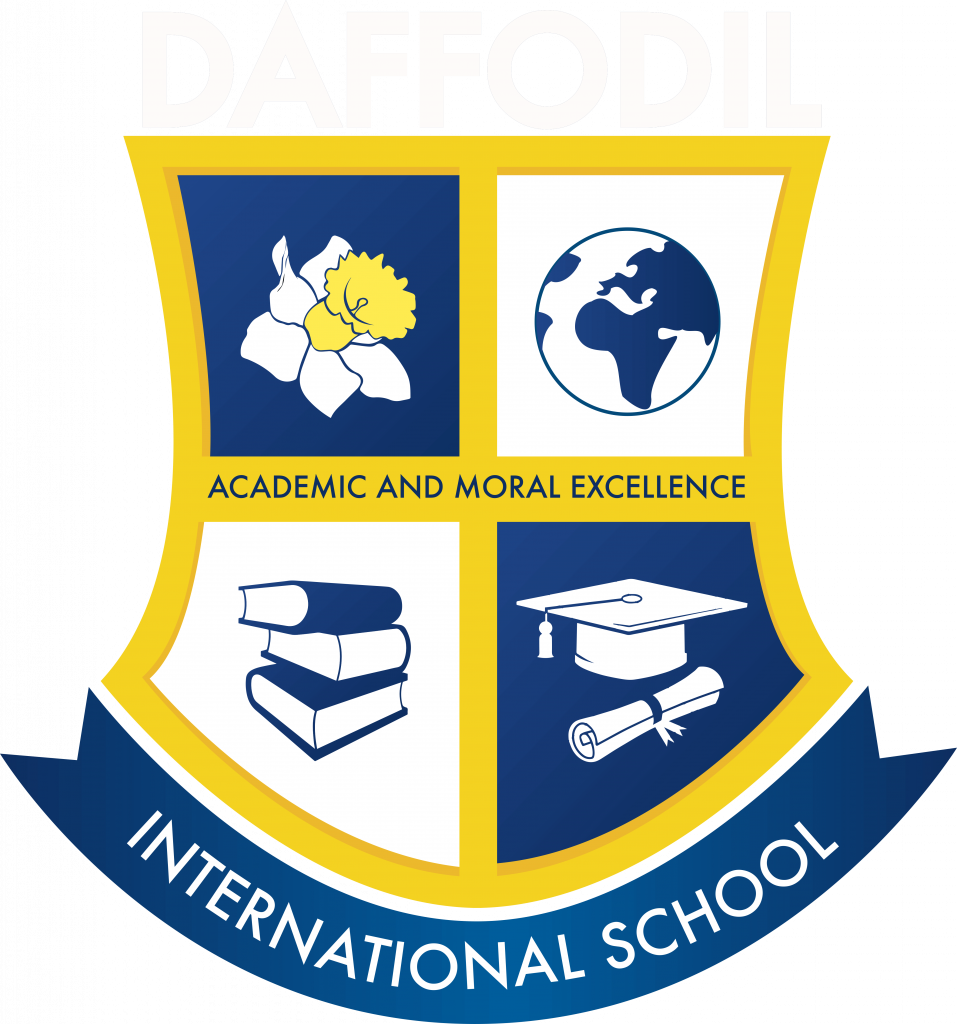Academics
Curriculum and Subjects
Daffodil International School’s early years and primary departments follow the Pearson Edexcel British curriculum (iEarly years and iPrimary). They have learning schemes, resources, and a rigorous staff development program to ensure that learners have the best learning experience possible from Early Years to Primary 6. All assessment tools are developed by Pearson and the marking and levels are administered by the school.
Our secondary school, on the other hand, follows the Cambridge curriculum. The school is in the process of becoming accredited.

1, Early Years and Foundation stage
Early Years and Foundation Stage (EYFS) is made up of:
- 1. Pre-nursery (1 year +)
- 2. Nursery (2 years +)
- 3. Pre-reception (3 years +)
- 4. Reception (4 years +)
The following subjects are taught at our Preschool:
- 1. English /Literacy
- 2. Mathematics /Numeracy
- 3. Understanding Our Environment
- 4. Communication and language
- 5. Personal, social and emotional development
- 5. Expressive art and design or creative art.
- 6. Physical education
Subjects offered focus on the five main areas of child development: cognitive development; Social and emotional development; Speech and language; Growth and Development; Fine motor skill development and Gross motor skill development. These strands are benchmarked to ensure that children meet their developmental milestones.
2, Primary Department
Daffodil primary department is referred to in Key Stages. Please see the table below:
Ages (Years)
Years (Class)
Key Stage
*End of Key Stage Assessment by Pearson (Internally administered)
Ages (Years)
Years (Class)
Key Stage
**End of Key Stage Assessment by Pearson (Externally Administered)
Pearson Edexcel iPrimary is a complete program for use in International Primary Schools for English, Mathematics, Science, Computing, and Global Citizenship, for children aged 3 to 11 years.
Mathematics
The mathematics curriculum, which is based on the British English National curriculum (2014), is based on recent findings from education research. It is intended to give students the strongest mathematical foundation possible and to get them ready for the
Lower Secondary and IGCSE exams. Although the content is based on the British National Curriculum, there is room for using localized examples and learning tools in the delivery. The learning and pedagogy are based on how well students can translate problems into mathematical or non-mathematical contexts. The skills acquired are assessed through written examination questions that develop their problem-solving abilities by translating problems into mathematical or non-mathematical contexts. The skills acquired are assessed through written examination questions that develop their problem-solving abilities by translating problems into mathematical or non-mathematical contexts.
The four main areas covered are as follows:
- 1. Number − Integers; Addition and subtraction; Multiplication and Division; Four operations; Fraction and decimals; Percentages; Ratio and Proportion
- 2. Algebra – Sequences; Expressions and Formulae; Equations Topic
- 3. Geometry – Measure; Shape; Angles; Position and Direction Topic
- 4. Statistics – Using and interpreting data (This is the applied Maths element)
It is expected that students who complete this programme:
- 1. Are proficient in mathematics fundamentals
- 2. Has increased speed and accuracy in recalling and applying formulas, terminology, and facts (Drill element)
- 3. Can apply mathematical procedures, notations, and concepts to given contexts
- 4. With limited guidance, can present and organize data in a variety of formats, interpret information from graphs, tables, charts, and lists, and draw conclusions.
- 5. Can make logical decisions on mathematical processes to solve real-world problems.
- 6. Can solve problems by applying mathematics to a variety of routine problems with increasing sophistication, such as breaking problems down into a series of simpler steps and persisting in seeking solutions
English
The English curriculum is based on recent findings from education research and is based on the British English National Curriculum (2014). This means that it is constantly reviewed and updated.
Literacy skills are developed to assess students’ ability to read and give feedback on both fiction and non-fiction texts, to analyze texts and understand how writers achieve their effects, and to create and communicate meaning through written language.
The three (3) main strands in iPrimary English are
- 1. Reading
- 2. Grammar and Punctuation
- 3. Writing
It is expected that Learners will:
- 1. Read and respond to different types of non-fiction and fiction texts
- 2. Read and respond to texts showing good understanding
- 3. Develop a diverse vocabulary, as well as an understanding of grammar and knowledge of linguistic conventions for reading and writing.
- 4. Write with clarity and accuracy, adapting language and style to suit different purposes and contexts.
Science
The Science curriculum is based on the British English National Curriculum (2014) and emphasizes inquiry-based learning.
The curriculum is intended to foster learners’ curiosity about the natural world. insight into working scientifically, and appreciate the relevance of science to their everyday lives.
Learners complete 7 units in Biology, 4 in Chemistry, and 6 in Physics. It is expected that learners will have numerous opportunities to use the scientific inquiry process as they acquire knowledge. They will gain knowledge of scientific concepts, be able to gather data using the appropriate tools, obtain and present results either quantitatively or qualitatively, based on data patterns, make inferences, and assess their findings.
Computing
Based on the British English National curriculum (2014), the Computing curriculum is designed using up-to-date education research findings. This means it is continuously reviewed and updated.
The International Award in Primary Computing aims to ensure that all students:
- can understand and apply the fundamental principles and concepts of computer science.
- can analyze and apply information technology to solve problems, as well as write computer programs.
- use information and communication technology in a responsible, competent, confident, and creative manner.
The program is divided into two sessions: computer science (computer programming) and digital technology (software application).
Daffodil has a modern computer lab. Learners are also encouraged to have personal computers at home which allows them a better learning experience through the iPrimary digital active learning platform where resources are allocated for students.
Global Citizenship
This focuses on the humanities, which learners require to be more aware not only of their surroundings’ geographical, historical, and social norms, but also to appreciate interpersonal connections and understand rules and regulations.
Global citizenship is intended to accomplish the following goals:
- Develop the skills of research, analysis, evaluation, reflection, collaboration, and communication.
- Uses a combination of print and digital resources, as well as a wealth of support, to bring topics to life and allow students to investigate important global issues.
- Each topic is addressed in a sensitive, age-appropriate manner, with ample opportunity for discussion and deeper learning.
Topics covered include:
- Social Justice and Equality
- Identity and Diversity Globalisation and Interdependence
- Peace and Conflict
- Human Rights
- Power and Governance
- Sustainable Development

